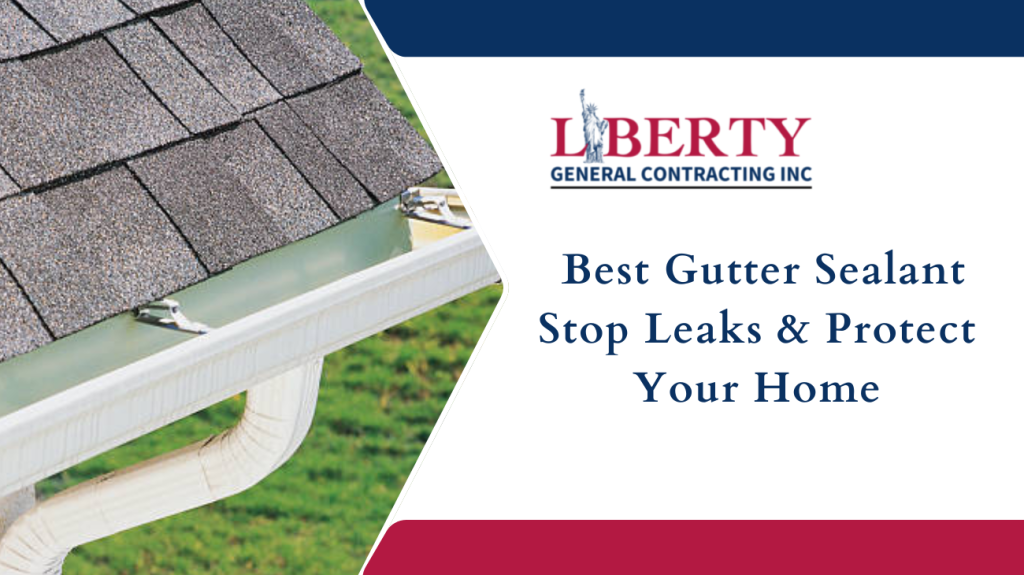A well-maintained gutter system is important for every home because it protects your roof, walls, and foundation from water damage. However, over time, gutters can develop cracks, holes, and leaks due to weather, rust, or aging materials. One of the simplest and most effective solutions to fix these issues is by using gutter sealant. It is an affordable product that can seal leaks, prevent water overflow, and extend the life of your gutters.
In this article, we will cover everything you need to know about gutter sealants—what they are, why they are important, the different types available, how to apply them, and tips for choosing the right product for your home.
What Is Gutter Sealant?
Gutter sealant is a waterproof product used to fix and seal leaks in gutter systems. It creates a strong, flexible, and weather-resistant barrier that stops water from escaping through cracks, seams, joints, or holes in gutters. It is commonly used on metal, vinyl, aluminum, and PVC gutters.
Whether your gutter is leaking at the corner joint, along a seam, or near the downspout, a good quality gutter sealant can quickly seal the damaged area and prevent further water damage.

Why Do Gutters Leak?
Even if your gutters were installed correctly, several factors can cause leaks over time:
- Weather exposure: Heavy rain, snow, and heat weaken the gutter material
- Rust or corrosion: Metal gutters deteriorate when exposed to moisture and oxygen
- Clogging: Leaves and debris cause water overflow and increase pressure
- Aging material: Old gutters naturally crack and weaken
- Poor installation: Improper alignment or sealed joints may loosen
- Loose fasteners: Nails or screws can create leak spots when they rust
Using a reliable gutter sealant helps fix these issues quickly and prevents expensive repair work later.
Benefits of Using Gutter Sealant
Applying gutter sealant offers many advantages that help protect your home and reduce maintenance costs:
- Quick and Affordable Repairs
Instead of replacing the entire gutter, you can seal cracks or leaks at a low cost.
- Prevents Water Damage
Sealing leaks ensures rainwater flows correctly through the gutter system and away from your home’s foundation, walls, and roof.
- Weather Resistant
A good gutter sealant withstands heat, rain, snow, UV rays, and temperature changes without breaking down.
- Long-Lasting Strength
Quality sealants remain flexible and durable, lasting for years without cracking.
- Improves Home Value
Well-maintained gutters improve curb appeal and protect the overall structure of your home.
Types of Gutter Sealants
There are several types of gutter sealants available, and choosing the right one depends on gutter material, climate, and level of repair required. The most common types include:
| Type of Gutter Sealant | Key Features | Best For |
| Silicone Sealant | Flexible, waterproof, UV-resistant | All gutter types, high-temperature areas |
| Polyurethane Sealant | Extremely strong, long-lasting bond | Metal gutters, severe cracks |
| Acrylic Sealant | Easy to apply, paintable, affordable | Small repairs and mild climates |
| Butyl Rubber Sealant | Sticky, flexible, great for seams | Sealing gutter joints and downspouts |
| Tape Sealant | Quick, mess-free fix | Temporary repairs and DIY fixes |
If you want a durable and long-lasting solution, polyurethane or silicone gutter sealant is generally the best choice. For small, fast DIY fixes, sealant tape can work temporarily.
Where Should You Apply Gutter Sealant?
Gutter sealant is used to seal leaks in various parts of the gutter system, including:
1. Corner Joints
Apply sealant where two gutter sections meet, as these joints often loosen and cause leaks. Sealing keeps water from dripping through the corners.
2. End Caps
End caps close the ends of gutters but can develop gaps over time. A layer of sealant around the edges stops water from escaping.
3. Downspout Connections
This area handles strong water flow, so leaks are common. Sealant keeps the connection tight and ensures smooth flow into the downspout.
4. Seams Between Gutter Sections
Seams can separate due to weather and aging. Applying sealant prevents water from leaking through these joining lines.
5. Small Cracks and Holes
Minor cracks or holes allow water to escape and cause damage. A quick coat of sealant fixes them and prevents the problem from growing.
6. Around Fasteners or Screws
Screws and brackets can loosen, creating small leak spots. Sealant around fasteners blocks water from seeping through these openings.
Sealant should always be applied to clean and dry surfaces for the best results.
How to Apply Gutter Sealant (Step-by-Step Guide)
You can apply gutter sealant yourself, even if you are not a professional. Here is a simple guide to help you with the process:
1. Clean the Gutter Area
Remove dirt, leaves, rust, debris, and old sealant using a brush or scraper. Cleaning ensures better adhesion.
2. Dry the Surface Completely
Moisture prevents the sealant from bonding properly, so make sure the area is completely dry.
3. Sand the Area (Optional)
Light sanding helps remove rust and smoothens the surface for better sealing.
4. Apply the Gutter Sealant
Cut the sealant tube tip at a 45° angle and apply an even bead over the crack, seam, or joint. For larger holes, apply two coats.
5. Smooth the Sealant
Use a gloved finger or putty knife to spread the sealant evenly.
6. Let It Cure
Allow 24–48 hours for the sealant to dry and fully cure before exposing it to rain.
How Long Does Gutter Sealant Last?
The lifespan depends on the product, weather conditions, and application quality. On average:
- Silicone and Polyurethane sealants last 10–20 years
- Acrylic sealants last 3–5 years
- Sealant tape lasts 6–12 months
Quality gutter sealant applied properly can protect your gutters for many years without needing frequent reapplications.
Signs That You Need to Reapply Gutter Sealant
You should check your gutters at least once a year. Reapply sealant if you notice:
- Water dripping from joints or seams
- Cracks or peeling sealant
- Rust or corrosion forming around gaps
- Water stains on siding or walls
Early repair helps prevent expensive structural damage.
How to Choose the Right Gutter Sealant
Before buying gutter sealant, consider these factors:
- Compatibility
Choose sealant that works with your gutter material—aluminum, PVC, steel, or copper.
- Weather Resistance
If you live in a hot or cold region, pick a sealant that remains flexible in extreme temperatures.
- Longevity
For long-term protection, polyurethane or silicone sealants are best.
- Ease of Application
For beginners, acrylic or sealant tape is easier to use.
- Waterproof Strength
Ensure the product is fully waterproof and designed for outdoor use.
Gutter Sealant vs Gutter Replacement: Which Is Better?
| Situation | Best Solution |
| Small cracks, loose joints, minor leaks | Use gutter sealant |
| Aging gutters with multiple leaks | Seal temporarily, plan replacement |
| Heavily rusted or damaged gutters | Replace the gutter system |
Using gutter sealant is an affordable and quick fix, but if your gutters are old and badly damaged, a full replacement may be the smarter option.
Final Thoughts
Gutter sealant is a simple but powerful product that helps protect your home from water damage. It seals leaks quickly, strengthens your gutter system, and delays expensive replacements. With the right type of sealant and proper application, you can keep your gutters strong, waterproof, and long-lasting.
Whether you choose silicone, polyurethane, acrylic, or sealant tape, make sure it is suitable for your gutter material and your climate. Regular maintenance and timely repairs can save you thousands of dollars in future home damage.Investing in a high-quality gutter sealant ensures your home stays dry, protected, and damage-free all year round.
Contact Liberty GCNY
Website: www.libertygcny.com
Phone: (347) 682-9840
Serving: Manhattan, Brooklyn, Queens, The Bronx, and Staten Island
Address: 251 N Regent St, Port Chester, NY 10573, United States
Need Help with Your Next Project? Call Liberty GCNY Today!
Fast responses. Expert advice. Trusted service across NYC and beyond.


